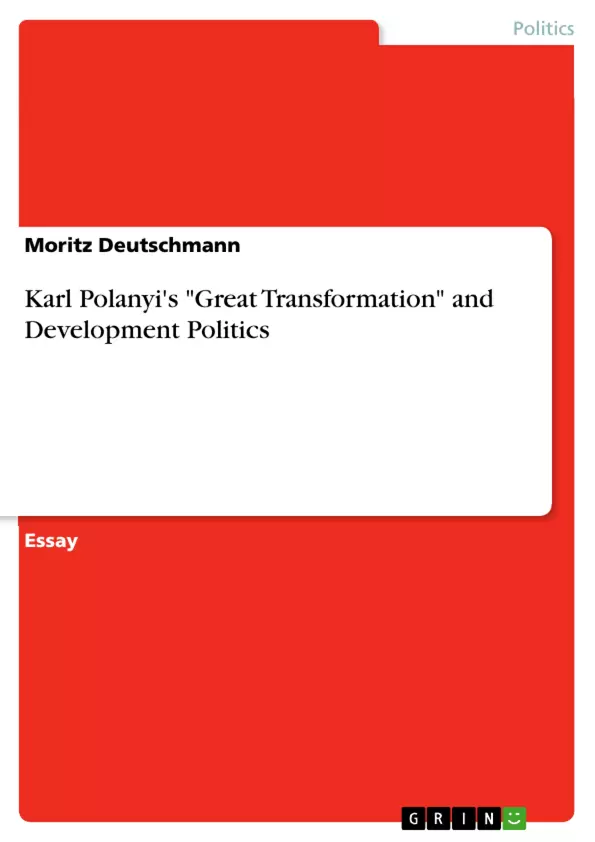Attempts to understand the transformation processes in the developing world have often led to a closer examination of Europe′s and America′s own history, as many theories of development suggest a specific interpretation of these histories: Modernization theorists, for example, see Europe′s and America′s history mainly as a straightforward progression towards welfare and democracy, eclipsing the aspects that do not fit into this picture, like the World Wars or the American Civil War. Therefore, although Karl Polanyi′s "The Great Transformation" treats mainly historical events in Europe, it can at the same time be an important contribution to our understanding of the economic and social transformations in the developing world. In this essay, I will first try to make clear, what assumptions underlie Polanyi′s argument and what he means by the notion of "market society". I will proceed in three steps: first, I will explore the different roles that the economy, according to Polanyi, plays in capitalist and pre-capitalist societies; I will look then at the historical processes that led to the rise of a "market society". Finally, I will discuss the political reactions to these processes which can be characterized, in Polanyi′s view, by a "double movement".
As Polanyi is one of the most important critics of economic liberalism, it is helpful to compare his account of the "Great Transformation" to a second, even more influential anti-liberal perspective, Marxism. Apart from some similarities, the fundamental difference seems to be that Polanyi does not give a positive account of modernization. This leads to the question, how Polanyi′s theories can improve our understanding of development today. I will mainly argue that although Polanyi gives an impressive account of the limits of a market economy, his treatment of politics is much too loose to be convincing.
Inhaltsverzeichnis (Table of Contents)
- Introduction
- Economy and Society in Pre-capitalist and Capitalist Societies
- The Creation of a Market Society and the Double Movement
- Polanyi and Marxism
- Polanyi, Development and Capitalist Society
- Literature
Zielsetzung und Themenschwerpunkte (Objectives and Key Themes)
This essay explores Karl Polanyi's "The Great Transformation" and its relevance to development politics. It aims to analyze Polanyi's critique of market society, his understanding of the historical emergence of capitalism, and the implications of his theories for understanding contemporary development challenges.
- The role of the economy in pre-capitalist and capitalist societies
- The rise of market society and its social consequences
- The "double movement" as a response to market pressures
- Comparison of Polanyi's critique of economic liberalism with Marxism
- The relevance of Polanyi's work to development politics today
Zusammenfassung der Kapitel (Chapter Summaries)
- Introduction: This chapter sets the stage by outlining the essay's objectives and framing Polanyi's work within the context of development studies. It highlights the importance of examining historical transformations in understanding contemporary development processes.
- Economy and Society in Pre-capitalist and Capitalist Societies: This chapter contrasts the role of the economy in pre-capitalist and capitalist societies. It emphasizes that markets in pre-capitalist societies were embedded in social and political structures, whereas capitalism seeks to separate the economy from society. Polanyi argues that the "moral economy" of pre-capitalist societies regulated exchange, while the pursuit of individual profit becomes the dominant driver in capitalist societies.
Schlüsselwörter (Keywords)
The key concepts and themes explored in this essay include: market society, economic liberalism, double movement, embeddedness, moral economy, pre-capitalist societies, capitalism, development politics, modernization, Marxism, Polanyi, The Great Transformation.
Frequently Asked Questions
What is Karl Polanyi's concept of a "market society"?
Polanyi describes a market society as a system where the economy is disembedded from social relations and the pursuit of profit becomes the dominant driver.
What does the term "double movement" mean?
It refers to the dialectical process where the expansion of the market is met by a counter-movement from society to protect itself from the market's destructive effects.
How does Polanyi's view differ from Marxism?
While both criticize liberalism, Polanyi does not provide a positive account of modernization and focuses more on the social "embeddedness" of the economy.
Why is "The Great Transformation" relevant to development politics?
Polanyi's analysis of historical shifts in Europe helps in understanding the economic and social transformations currently occurring in the developing world.
What is a "moral economy" in pre-capitalist societies?
It is an economic system regulated by social and political norms rather than purely by self-regulating market prices.
- Arbeit zitieren
- Moritz Deutschmann (Autor:in), 2006, Karl Polanyi's "Great Transformation" and Development Politics, München, GRIN Verlag, https://www.hausarbeiten.de/document/63550


